Summer intern offer letter template
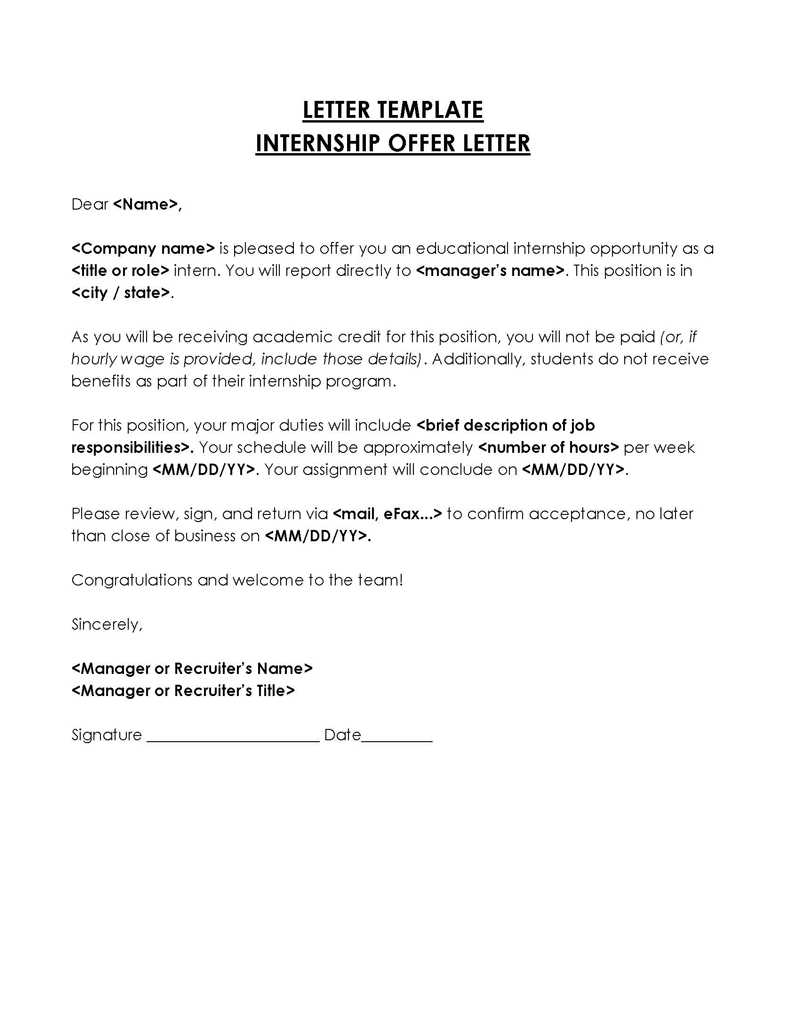
Providing a well-structured offer letter is one of the most direct ways to confirm your intern’s position and expectations. The offer letter should be clear, concise, and outline all key details of the internship, including the role, duration, compensation, and any other important terms.
Start with a clear position title and mention the name of the company and the specific department the intern will be working in. This sets the context and gives the intern a clear understanding of their role. Include the start and end dates of the internship, ensuring both parties are aligned on the timeline. If applicable, state whether the internship is paid and provide details about the compensation or stipends offered.
Be specific about expectations. Describe the primary responsibilities and tasks the intern will be expected to carry out. Highlight any goals or objectives they should focus on during their time with your company. Be sure to outline any training, mentorship, or guidance the intern will receive, making it clear that the internship is a learning opportunity as well as a professional experience.
Finally, mention any additional perks or benefits that come with the position, such as transportation allowances or networking opportunities. The letter should close with a friendly but professional tone, encouraging the intern to reach out if they have any questions before officially accepting the offer.
Summer Intern Offer Letter Template
Begin your offer letter with a clear and direct statement confirming the internship offer. Mention the intern’s role, start date, and duration of the internship.
Clearly outline the compensation and any benefits provided, such as stipends, travel reimbursement, or other perks. Specify payment terms, including the frequency of payments.
Provide details about the work schedule, expected working hours, and flexibility. Include any specific training or resources that will be provided to support the intern’s success in the role.
Make sure to explain expectations regarding conduct, confidentiality, and intellectual property. This helps set clear boundaries and responsibilities from the start.
Close the letter with a welcoming tone, inviting the intern to reach out if they have any questions. Encourage them to confirm their acceptance and provide the necessary documentation for the onboarding process.
| Section | Details |
|---|---|
| Internship Role | Specify position and department |
| Start Date | Clearly state the first day of the internship |
| Compensation | List the stipend or hourly rate, payment schedule |
| Work Schedule | Define expected working hours and flexibility |
| Training/Support | Outline available training and resources |
| Confidentiality & Conduct | Provide guidelines on behavior and confidentiality |
| Acceptance | Request confirmation and next steps |
How to Structure an Offer Letter for Interns
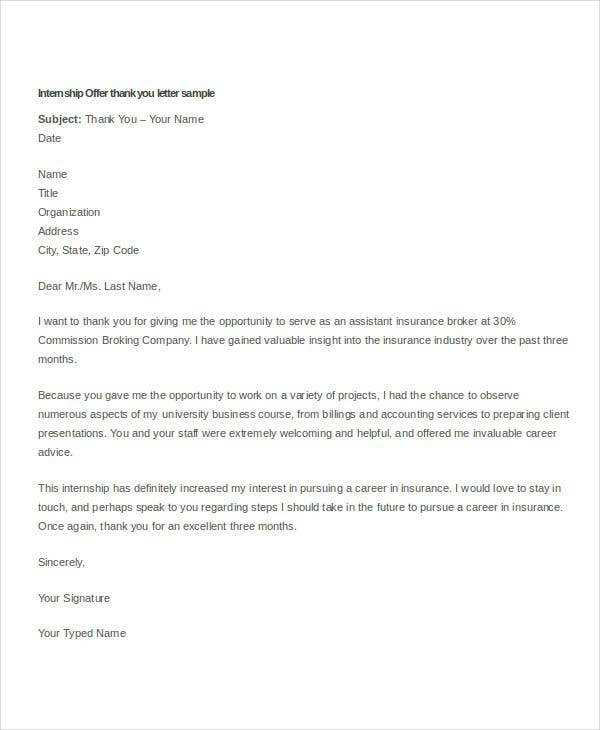
Begin with a clear and concise heading. Address the recipient by name and use a professional, yet warm tone. State the position the intern is being offered, along with the starting date and duration of the internship.
Introduction
Include a brief welcome statement, confirming the internship role. This is an opportunity to express enthusiasm about the intern’s potential contribution to the team. Mention any key expectations and emphasize the internship’s value as a learning experience.
Role and Responsibilities
List the specific tasks the intern will be responsible for. Include details about daily duties, reporting structure, and any specific goals the intern will be expected to achieve. Be clear about the level of autonomy they will have and provide insight into how the role fits within the broader organization.
Ensure the letter covers details about compensation or benefits, if applicable. Outline the stipend or hourly wage, if offered, and clarify whether the internship is paid or unpaid. Add any additional perks, such as access to company events or training opportunities.
Conclude the letter with a call to action. Request that the intern confirm their acceptance of the offer and specify a deadline for their response. Include a contact person for any questions they may have before making their decision.
Key Information to Include in the Offer Letter
Include clear details about the internship position to avoid confusion later on. Be specific about the role, responsibilities, and expectations.
Position and Responsibilities
- State the job title and provide a brief description of the main duties.
- Clarify the department or team the intern will be working with.
Compensation and Benefits
- Clearly state if the internship is paid or unpaid.
- If paid, mention the hourly wage or stipend, and payment frequency.
- Include any additional benefits such as transportation stipends, meals, or accommodation if applicable.
Include start and end dates for the internship, as well as working hours or a schedule. Specify if the internship is full-time or part-time, and if there is flexibility in work hours.
Reporting and Mentorship
- Identify the supervisor or manager the intern will report to.
- Outline any mentorship or training programs that the intern will have access to.
Ensure the offer letter provides clear instructions on how the intern should confirm their acceptance, including any documents or forms required before starting.
Defining Internship Duration and Working Hours
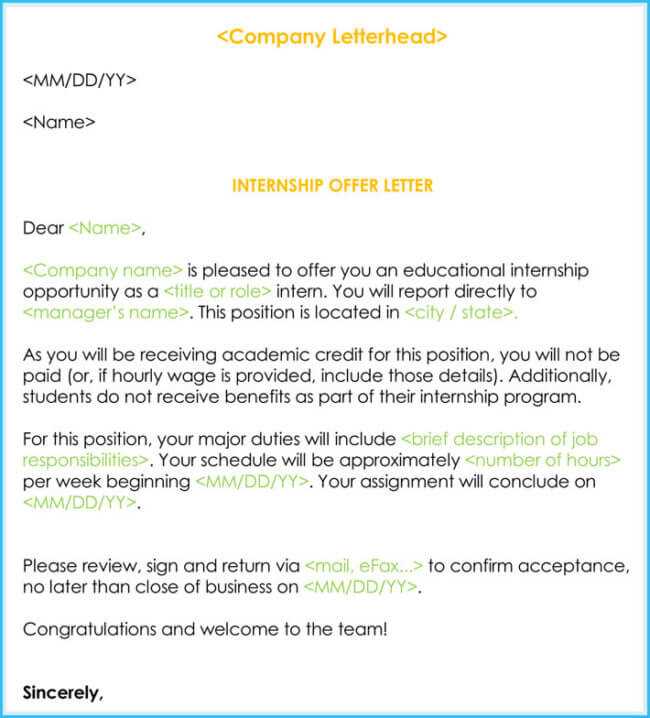
Specify the internship duration clearly in the offer letter. Typically, internships last between 6 weeks to 6 months, depending on the company’s needs and the intern’s availability. Be sure to state the start and end dates, as well as any possibility of extension, if applicable.
Working hours should also be well defined. Interns usually work between 20 to 40 hours per week. Outline the expected schedule, whether it’s part-time or full-time, and if flexibility exists. Include any requirements about office hours or remote work options to prevent misunderstandings.
Clarify any expectations regarding the intern’s availability for specific projects or meetings outside of standard hours, if necessary. Being transparent about working hours helps both parties manage expectations and ensures a smooth internship experience.
Setting Compensation and Benefits for Interns
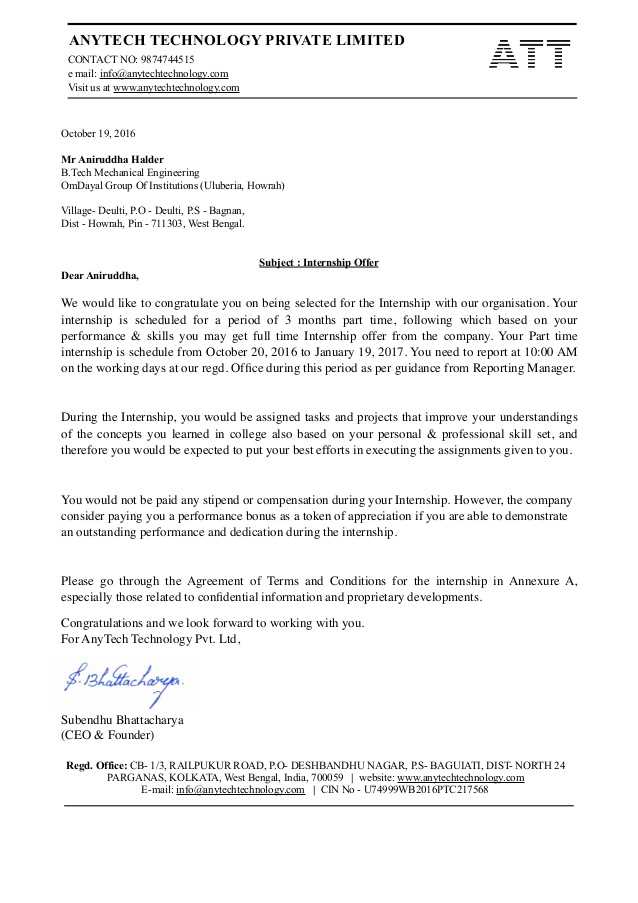
Offer a competitive and fair compensation package to attract top talent. Consider paying interns based on industry standards or the specific region to stay competitive while respecting your budget. If financial compensation is not feasible, explore non-monetary benefits like flexible work hours, remote work options, or learning opportunities.
Include clear details in the offer letter about the hourly rate, weekly work hours, and any other financial incentives. Be transparent about whether the position is paid or unpaid, and if the latter, clarify the learning benefits and exposure the intern will receive.
In addition to compensation, offer perks such as access to company events, training sessions, or mentorship programs. These benefits increase the value of the internship experience beyond just financial compensation and improve retention rates.
Lastly, be mindful of local labor laws and regulations regarding intern compensation. Ensure compliance with any minimum wage requirements or other legal obligations, as failure to do so may result in penalties.
Outlining Expectations and Responsibilities
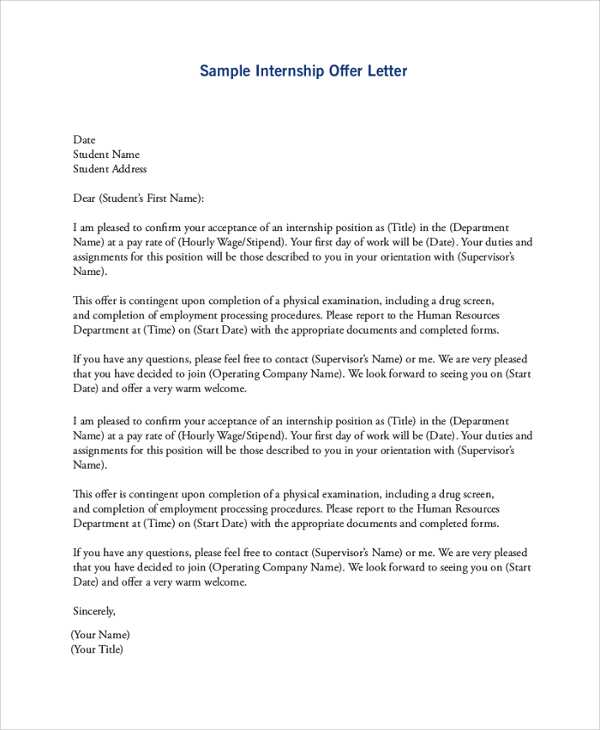
Be clear about the key tasks and goals for the internship role. Provide a structured list of daily duties and broader objectives that align with the intern’s growth and the team’s needs. This clarity will help them stay focused and understand their contributions to the team.
- Job Description: Detail specific tasks and projects the intern will handle, such as research, data entry, assisting with client communication, or supporting team initiatives.
- Learning Outcomes: Outline the skills and knowledge the intern should gain, such as industry-specific tools, methods, or communication techniques.
- Work Schedule: Specify the number of hours per week and any flexibility in the schedule, including expectations for punctuality and availability for meetings or deadlines.
- Collaboration: Set expectations for working alongside team members. Highlight areas where the intern will need to contribute to group projects or communicate across departments.
Additionally, clarify any reporting lines or mentors that will support the intern. Ensure they know whom to approach for feedback, guidance, and problem-solving. This direct access to support will make the experience smoother for both the intern and the team.
- Feedback and Communication: Define how and when performance feedback will be given, such as weekly check-ins or end-of-term evaluations.
- Workplace Etiquette: Provide a brief on expected professional behavior, such as how to communicate within the team, handling emails, or participating in meetings.
By setting these expectations early on, you can avoid misunderstandings and help the intern stay motivated and focused on the right tasks. This clarity also benefits the team by ensuring the intern’s role is aligned with business goals.
Legal Considerations and Intern Agreement
Clearly define the intern’s role, responsibilities, and compensation in the agreement. Specify whether the internship is paid or unpaid, including the duration and hours of work. Outline expectations regarding attendance, behavior, and adherence to company policies. Be clear about the nature of the internship, stating if it is educational or employment-based.
Compensation and Benefits
If the internship is paid, detail the hourly rate, stipend, or salary. Additionally, include any benefits such as transportation reimbursement or meal allowances. For unpaid internships, ensure compliance with local labor laws to avoid misclassification of the intern as an employee.
Confidentiality and Non-Disclosure
Interns should sign a non-disclosure agreement (NDA) if they will have access to sensitive or proprietary company information. Make sure the NDA is clear on what constitutes confidential information and the duration of confidentiality obligations after the internship ends.
Clarify any intellectual property ownership rights in the agreement. Specify that any work produced during the internship belongs to the company unless otherwise agreed upon.